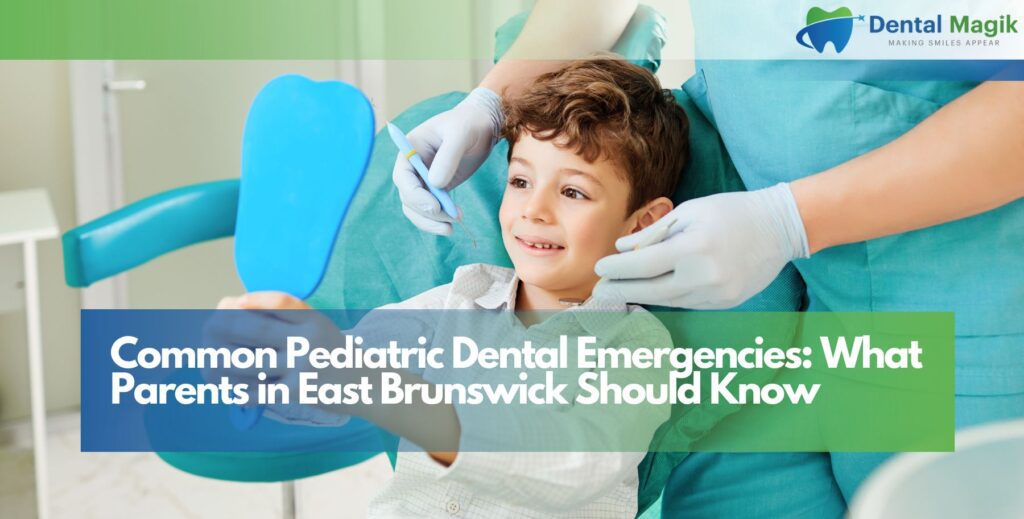Dental emergencies in children can be sudden, stressful, and painful—for both kids and parents. Whether it’s a broken tooth on the playground or a painful toothache at night, knowing how to react makes a big difference. This guide walks you through the most common pediatric dental emergencies, what to do in the moment, and when to see a pediatric dentist right away.
If you live in East Brunswick, NJ, this information will help you feel more confident about protecting your child’s smile when things don’t go as planned.
Understanding Pediatric Dental Emergencies
Kids are active, curious, and often fearless—making them more prone to bumps, falls, and accidents. Pediatric dental emergencies involve sudden injuries, infections, or pain that need quick attention to relieve discomfort and avoid long-term problems.
Ignoring a dental emergency can lead to infections, permanent tooth damage, or even problems with future adult teeth. Acting quickly is key.
Toothaches in Children
A toothache may seem minor, but it often signals a bigger issue like tooth decay, a cavity, or even a dental abscess.
What You Should Do:
- Rinse your child’s mouth with warm water.
- Use dental floss gently to remove food stuck between teeth.
- Apply a cold compress to reduce swelling.
- Avoid giving aspirin.
- Schedule a dental visit immediately.
When to See the Dentist:
If the pain lasts more than a few hours or is severe, it’s time to see a dentist.
Chipped or Broken Tooth
A chipped tooth from a fall or bite can expose the nerve or cause pain when chewing.
What You Should Do:
- Save the broken piece if possible.
- Rinse the mouth with water.
- Apply a cold compress to reduce swelling.
- Cover any sharp edges with dental wax if needed.
When to See the Dentist:
Immediately. Prompt care can often repair or save the tooth.
Knocked-Out Tooth (Avulsed Tooth)
If a permanent tooth is knocked out, it’s a serious emergency. For baby teeth, don’t try to reinsert.
What You Should Do:
- For a permanent tooth, rinse it gently without touching the root.
- Try placing it back into the socket or store it in milk.
- Head to the dentist within 30 minutes for the best chance of saving it.
When to See the Dentist:
Immediately. Time is critical in saving the tooth.
Dental Abscess or Swelling
A painful, swollen gum or face could be a sign of a dental abscess, which is a bacterial infection. It needs urgent care to prevent it from spreading.
What You Should Do:
- Apply a cold compress.
- Do not pop or press the swelling.
- Give child-safe pain relief if needed.
When to See the Dentist:
Same day. An abscess can become life-threatening if ignored.
Object Stuck Between Teeth
Food or objects stuck between teeth can cause pain, swelling, or bleeding gums.
What You Should Do:
- Try flossing gently to remove it.
- Never use sharp tools like pins or toothpicks.
When to See the Dentist:
If you can’t remove the object or your child is in pain, seek help.
Bitten Tongue, Lip, or Cheek
These injuries often happen during falls or while chewing.
What You Should Do:
- Rinse the area gently.
- Apply pressure with gauze to stop bleeding.
- Use a cold compress for swelling.
When to See the Dentist:
If bleeding won’t stop after 15 minutes or the injury is deep.
Broken or Lost Dental Fillings
Losing a dental filling can cause sensitivity, pain, or food getting stuck.
What You Should Do:
- Keep the area clean.
- Avoid chewing on that side.
- Apply dental wax for protection if needed.
When to See the Dentist:
As soon as possible to prevent further damage or infection.
Orthodontic Emergencies (Braces Problems)
Loose wires, brackets, or broken appliances can cause discomfort and irritation inside the mouth.
What You Should Do:
- Use orthodontic wax to cover sharp edges.
- Use tweezers to reposition wires if needed.
When to See the Dentist or Orthodontist:
Within a few days if it’s not urgent; same day if causing pain or poking gums.
How to Prevent Pediatric Dental Emergencies
- Mouthguards: Use them for sports or physical activities.
- Supervised brushing: Teach kids to brush properly.
- Healthy diet: Limit sugary snacks and drinks.
- Regular dental visits: Early checkups help catch issues before they become emergencies.
- Childproofing at home: Reduce fall hazards and teach safe habits.
Conclusion
Dental emergencies in children can be scary—but knowing how to handle them makes all the difference. Staying calm, acting quickly, and calling your local dentist is the best approach.
If your child faces any dental emergency, don’t wait. Reach out to a trusted Dentist in East Brunswick, NJ who can offer expert care and peace of mind for your family.
FAQs
What’s the most common dental emergency in kids?
Toothaches and chipped teeth are the most common, usually from cavities or playground accidents.
Can baby teeth be reimplanted?
No. Baby teeth shouldn’t be put back if knocked out. Visit the dentist to check for damage to surrounding teeth.
Should I give my child aspirin for tooth pain?
No. Aspirin isn’t safe for children. Use child-appropriate pain relievers like ibuprofen or acetaminophen.
When should I call the dentist right away?
Call immediately for knocked-out teeth, severe swelling, uncontrolled bleeding, or intense pain.
How can I prevent dental injuries during sports?
Always have your child wear a mouthguard during sports or physical activity. Custom-fit ones offer the best protection.







